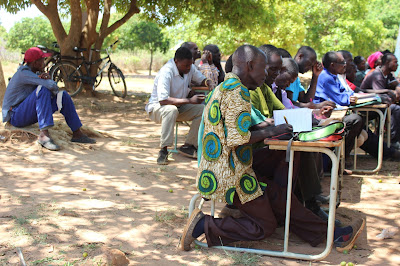 |
| Representatives of beneficiary cooperatives in Kabompo |
For the livestock sub-sector in particular, the Ministry of Fisheries and Livestock has embarked on an ongoing livestock stocking and restocking exercise with the aim of improving rural household incomes and playing its role in making farming a business.
Through the Enhanced Livestock Investment Program (ESLIP), the Ministry intends to compensate the sub-sector for the losses it has incurred through various livestock diseases over the years while at the same time working towards improving livestock production systems.
Of all the provinces, North Western is among the ones that has a terrain and vegetation that are favourable for rearing of various livestock. However, the livestock population in the province is yet to reach its highest potential. Some farmers in the province have attributed this to some common livestock diseases that continue to pose a threat.
It is farmers in such predicaments that ESLIP has targeted to benefit from the livestock restocking exercise. The objective of this endeavor is to stimulate sustainable market-oriented livestock systems through which rural communities can increase their household incomes.
While many farmers are benefiting as individuals through their community cooperatives and farming groups, a younger generation - particularly orphans at Mulunda Muyaka orphanage in Kasempa - stand to benefit in various ways after their orphanage was included in the recent round of goats that were being given to farmers in Kasempa and Kabompo districts as part of the livestock restocking exercise.
Pam Simenda who is the pioneer and coordinator of the orphanage said that in her care were 12 orphans who have either lost both parents; or their household’s breadwinner.
“The orphans I keep range between 6 to 17 years old…and receiving these goats will help us improve the nutrition of our orphans while also helping us pay their school fees…As our goats begin to increase in number, they will help us enable our orphans go beyond secondary school and enter universities,” Pam said.
The restocking exercise involves a pass-on practice through which the parent livestock are returned or rather “passed-on” to other members of the communities after they have given birth to their young. In the program, selected farmers from all provinces in the country have been targeted to receive livestock such as goats and chickens among others.
With regard to goats, Saudi Arabia has left an open door for Zambia to take up the opportunity and supply a consignment of 1 million goats annually. Hence through ESLIP, smallholder farmers have equal chances of taking advantage of the standing offer.
During a ceremony held in Kabompo to mark the official handover of goats and chickens to the beneficiary farmers in North Western Province, Fisheries and Livestock Permanent Secretary - Dr. Benson Mwenya - reminded the beneficiaries to resist the temptation to consume the animals they had received but rather focus on finding viable markets first.
He assured the farmers that government was on hand to help farmers reach for meaningful profits from what they had received.
“Government is going to put up bulking centres in all regions - for instance here in Kabompo - there will be a place where farmers can be putting their goats together and then they will be picked for the abattoirs, then send them to Saudi Arabia at a very god price. This money will be very competitive …it will stimulate [livestock] production,” Dr. Mwenya told farmers.
 |
| Some farmers taking notes during a presentation on prevention of livestock disease |
For Pam and the children at Mulunda Muyaka orphangage, the remarks from by Dr. Mwenya are something she has vowed to heed to, given the vision she has for the orphanage and its sustainability.
“These goats we’ve received from the government will help us start up other business which will help us diversify our incomes and we’ll be able to help more of such vulnerable children who are in our community,” she said.
Most goat farmers in North-Western province are privileged to benefit from a close-by international market in the Democratic Republic of Congo which today offers farmers up to K800 per goat.
But all is expected to go accordingly if farmers make the necessary efforts to ensure the health and nutrition of their animals is well maintained.
On the one hand, beneficiaries such as the coordinators of Mulunda Muyaka orphanage have undergone training in small livestock management as one way through which they can improve their livestock rearing skills and in the long run grow the livestock populations in their communities.
While on the other hand, and as one way of enhancing ownership, beneficiary groups are expected to contribute 10% of the value of the animals they received as part of a Community Animal Health Fund. Through affordable contributions, these farmers will be able to tend to sick animals in good time and ensure that they do not lose out on the investment.
If farmers can meet government efforts in this way, the livestock restocking exercise is destined to be sustainable and an effective way to grow the livestock sub-sector in a profitable way.NAIS




No comments:
Post a Comment